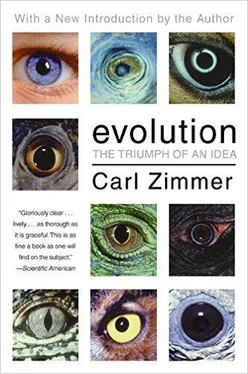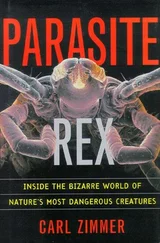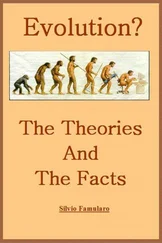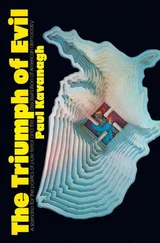But even if God does influence mutations, that doesn’t mean that He controls life like a micromanager. Miller points out that many Christians have long accepted that human history is influenced by chance and contingency, although it may indeed have an overall purpose we cannot fully comprehend. Nature, he argues, is no different. And thanks to that chance and contingency, life itself can evolve. “A God who presides over an evolutionary process is not an impotent, passive observer,” says Miller. “Rather, He is one whose genius fashioned a fruitful world in which the process of continuing creation is woven into the fabric of matter itself.”
Miller suspects that evolution has a destiny embedded within it, and we are part of it. “Sooner or later it would have given the Creator exactly what He was looking for—a creature who, like us, could know Him and love Him, could perceive the heavens and dream of the stars, a creature who would eventually discover the extraordinary process of evolution that filled His earth with so much life.”
Because God constructed the universe to follow certain natural laws, He made it possible for us to comprehend His creation, but thanks to chance and contingency, we have the freedom that Christianity demands. “God stands back from His creation not to abandon His creatures but to allow His people true freedom,” Miller writes. “He used evolution as the tool to set us free.”
Edward O. Wilson, the champion of sociobiology, has offered a very different vision of God in his writings. He grew up in a Southern Baptist family, and at age 14 he chose to be baptized. In a Pensacola, Florida, church a pastor dipped him into a tank of water, “like a ballroom dancer,” he later recalled, “backward and downward, until my entire body and head dipped beneath the surface.”
The baptism affected Wilson deeply, but in a physical way rather than in the spiritual way he had expected. He wondered if everything—the world itself—was only physical. “And something small somewhere cracked. I had been holding an exquisite, perfect spherical jewel in my hand, and now, turning it over in a certain light, I discovered a ruinous fracture.”
Wilson abandoned what he calls “a biological God, one who directs organic evolution and intervenes in human affairs.” Instead, he now leans toward Deism, the belief that God set in motion the universe and did not need to tinker with it afterward. But Wilson is not disheartened by the thought of living in such a universe:
The true evolutionary epic, retold as poetry, is as intrinsically ennobling as any religious epic. Material reality discovered by science already possesses more content and grandeur than all religious cosmologies combined. The continuity of the human line has been traced through a period of deep history a thousand times as old as that conceived by the Western religions. Its study has brought new revelations of great moral importance. It has made us realize that Homo sapiens is far more than an assortment of tribes and races. We are a single gene pool from which individuals are drawn in each generation and into which they are dissolved the next generation, forever united as a species by heritage and a common future. Such are the conceptions, based on fact, from which new intimations of immortality can be drawn and a new mythos evolved.
These three scientists, one an evangelical Christian, one a Catholic, one a Deist, cannot speak for all scientists, let alone all people. Science is the business of finding theories that explain the natural world and generating hypotheses that can be tested with evidence from our senses. It is up to all of us—nonscientists and scientists, Christians and Jews, Muslims and Buddhists, believers and agnostics and atheists—to ponder what the world actually means.
Darwin’s Silence
Some readers may not be happy to be plunged into such a cacophony of opinions at the end of this book. It might be more comforting to be guided to some single gleaming truth. But this ending is probably as Darwin would have wanted it.
Darwin wrestled with his spirituality for most of his adult life, but he kept his struggles private. When he boarded the Beagle at age 22 and began his voyage around the world, he was a devout Anglican. As he read Lyell and saw the slow work of geology in South America, he began to doubt a literal reading of Genesis. And as he matured as a scientist on the journey, he grew skeptical of miracles. Nevertheless, Darwin still attended Captain FitzRoy’s weekly services on the ship, and on shore he sought churches whenever he could find them. While in South Africa, he and FitzRoy wrote a letter together in which they praised the role of Christian missions in the Pacific. When Darwin returned to England, he was no longer a parson in the making but was certainly no atheist.
In the notebooks Darwin began keeping on his return, he explored every ‘implication of evolution by natural selection, no matter how heretical. If eyes and wings could evolve without help from a designer, then why couldn’t behavior? And wasn’t religion just another type of behavior? All societies had some type of religion, and their similarities were often striking. Perhaps religion had evolved in our ancestors. As a definition of religion, Darwin jotted down, “Belief allied to instinct.”
Yet these were little more than thought experiments, speculations that distracted Darwin every now and then from his main work: discovering how evolution could produce the natural world. Darwin did experience an intense spiritual crisis during those years, but science was not the cause.
At age 39, Darwin watched his father Robert slowly die over the course of months. He thought about his father’s private doubts about religion, and he wondered what those doubts would mean to Robert in the afterlife. At the time Darwin happened to be reading a book by Coleridge called Aids to Reflection, about the nature of Christianity. Nonbelievers, Coleridge declared, should be left to suffer the wrath of God.
Robert Darwin died in November 1848. Throughout Charles’s life, his father had shown him unfailing love, financial support, and practical advice. Was Darwin now supposed to believe that his doubting father was going to be cast into eternal suffering in hell? If that were so, then many other nonbelievers, including Darwin’s brother Erasmus and many of his best friends, would follow him as well. If that was the essence of Christianity, Darwin wondered why anyone would want such a cruel doctrine to be true.
Shortly after his father’s death, Darwin’s health turned for the worse. He vomited frequently and his bowels filled with gas. He turned to hydropathy, a Victorian medical fashion in which a patient was given cold showers and steam baths and wrapped in wet sheets. He would be scrubbed until he looked “very like a lobster,” he wrote to Emma. His health improved, and his spirits rose even more when Emma discovered that she was pregnant again. In November 1850 she gave birth to their eighth child, Leonard. But within a few months death would return to Down House.
In 1849 three of the Darwin girls—Henrietta, Elizabeth, and Anne—suffered bouts of scarlet fever. While Henrietta and Elizabeth recovered, 9-year-old Anne remained weak. She was Darwin’s favorite, always throwing her arms around his neck and kissing him. Through 1850 Anne’s health still did not rebound. She would vomit sometimes, making Darwin worry that “she inherits, I fear with grief, my wretched digestion.” The heredity that Darwin saw shaping all of nature was now claiming his own daughter.
In the spring of 1851 Anne came down with the flu, and Darwin decided to take her to Malvern, the town where he had gotten his own water cure. He left her there with the family nurse and his doctor. But soon after, she developed a fever and Darwin rushed back to Malvern alone. Emma could not come because she was pregnant again and only weeks away from giving birth.
Читать дальше












